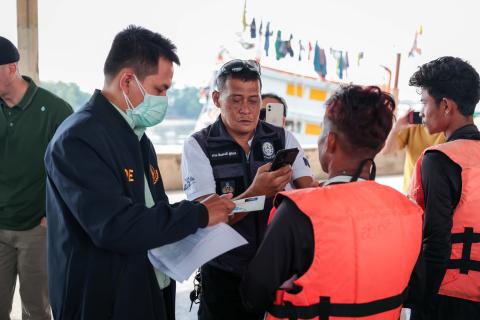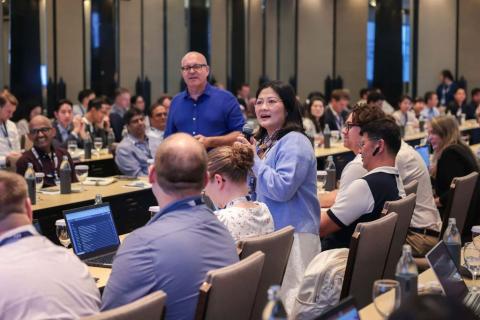A New Culture of Compliance will give the Seafood Industry Greater Confidence to Trade - Nov '24
Ten years ago, concerns about social and environmental abuse in global shrimp supply chains in Thailand created a crisis of confidence in the industry. A decade on, as The Seafood Task Force (STF) prepares to head to Bangkok for its annual summit, we know that the solutions lie within the industry and although progress can often be frustratingly slow and extremely challenging, we have implemented tangible improvements.
Now, as new allegations emerge, this time around working conditions in India and involving some of the biggest exporters to the US. Our collective objective must be to create a new culture of compliance that provides greater levels of confidence to trade.
Setting clear objectives:
The STF was born out of the 2014 shrimp crisis before we later expanded into tuna. It is the only global trade association where the world’s largest retailers, seafood brands and their partners work together (across the supply chain) to tackle issues of human rights, environmental degradation and Illegal, Unreported and Unregulated fishing (IUU) in tuna and shrimp supply chains.
Comprising over 40 members, it operates an annual programme to drive transparency, oversight and continuous improvement from vessel to plate. Our objectives are to produce fully traceable, ethically produced and environmentally responsible seafood.
How do we get there?
No one can doubt the scale of the challenge. We need to set out a roadmap of realistic, achievable measures – adopted and implemented by a coalition of the willing. Our programme is for the seafood industry, by the seafood industry, in a way that promotes competition and consumers’ interests; no one business can tackle these issues alone.

With large-scale sustainability certification efforts already underway, the Seafood Task Force is focusing its efforts on tackling underlying issues that impact the social and environmental conditions in the seafood sector - on the ground and on the water - not easily touched by traditional certification.
Our solution is an annual oversight and continuous improvement programme centred on the will of business and continuous focus by our members to achieving lasting change on the ground and on the water. It needs to be backed up by Government engagement, with a recognition that this presents its own challenges as administrations change and their priorities can vary accordingly.
Boots on the ground are essential; the STF’s role is to provide practical support and measurability. Businesses conduct their own due diligence, which we verify, and gaps identified during these assessments are used to develop remediation and work plans.
It is a carrot and stick approach.
What is the carrot? Global market confidence to trade seafood products and a competitive seafood industry with a transparent supply chain but reduced costs.
What is the stick? Tougher international social, environmental and due diligence standards will compromise the industry’s ability to trade if we cannot create a new culture of compliance.

Achievements:
Our approach is to under-promise and over-deliver, but it is important to remember that tangible achievements have already been delivered, including:
- the STF Social Code of Conduct in Thailand, widely regarded as best practice for social compliance
- a pioneering responsible Recruitment Program for shrimp and tuna
- the first ever country-wide Farmer Training Program in Thailand
- pioneering electronic traceability software, enabling traceability through track and trace of fish product from vessel to plate.
Challenges:
Having successfully encouraged the Thai government to reform outdated fishery laws in 2016, the country’s political landscape remains changeable, and we are currently working with the new government to prevent a relaxation of controls and a less transparent approach to important labour and environmental protections. There is a broad international consensus on this issue and we are lobbying alongside other concerned parties.
However, the initial challenges we saw in Thailand we are now encountering in other markets such as Vietnam, Indonesia and India. In regard to the latter, we are witnessing many of the same tensions, as the Indian industry gets to grip with challenges that confronted the Thai industry a decade ago. We held a summit in April 2024 which was attended by around 80% of the country’s producers and 12 organisations have so far joined the STF, committing to supply chain mapping.
No one is under any illusions about the scale of the challenge. But we know that with boots on the ground and using a tried and tested operational approach, we can follow the supply chain from the vessel onwards to get a baseline understanding of the current landscape.
The work that started in Thailand has expanded to Indonesia, Vietnam and India with nearly 100 social, traceability and environment assessments planned over the next 24 months; 80 per cent of the supply chain has already been mapped.
Action this day:
Looking ahead, we must understand that we will be judged by our actions rather than our words. The STF has a ten-point plan, which we track continuously. Our 2024/2025 plan includes:
- Increased accountability: all members must demonstrate traceability.
- Enhanced tuna supply chain oversight through a scalable program.
- Improved worker hiring practices through a responsible recruitment program and engagement with vessel owners, with a grievance mechanism in place for tuna vessels.
- Monitoring vessel behavior in conjunction with governments and strengthening government reforms through international engagement.
- A draft Environmental Code of Conduct for Aquaculture, including protecting natural habitat from conversion to shrimp farms.
Identifying best practice is key to success through an annual self-declaration of supply chain mapping, risk assessment and traceability allows members to share trends. Since 2020, 90% of members have completed and are currently submitting their supply chain mapping confirmations and 74% have presented a satisfactory self-declaration to the STF.
Supply chain mapping is not a one-off – it needs to be an annual recurring effort to meet changing international requirements and to maintain confidence to trade.
Conclusion:
Words are cheap, data is priceless. Measurable results are what matters. The industry needs to set the baseline; plot achievable goals; and plan a realistic timeline.
A new culture of compliance is essential for the seafood industry’s future. We need to go beyond certification because certification schemes only provide a single snapshot for certification at a single factory, farm, or group of farms. We must acknowledge that some issues are industry-wide and cannot be solved by any single actor alone. So, we must ensure that no one is left behind.
The STF offers solutions beyond traditional certification, promoting global market confidence through transparency and cost efficiency. Innovation arises from diverse approaches, not a one-size-fits-all method. Through these iterative processes, we will drive meaningful change and deliver best practise to the industry.
Martin Thurley - Executive Director